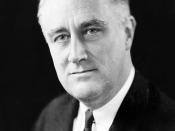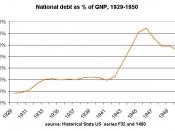Also, this essay was originally written as a DBQ essay. I tried to sift through and change things accordingly, but be sure to keep an eye out for references to documents that I may have missed.
The delineations of the words "liberal" and "conservative" shifted at the start of the Great Depression. Although laissez-faire policy was thought to be liberal in the Roaring 20's, the year 1929 quickly changed America's idea of liberalism entirely. The hardnosed Franklin Delano Roosevelt and the saavy Herbert Hoover both believed they alone could improve America's economic depression. Their political standings have been wholly analyzed, and although the two men did express ideas which were contradictory to their original political standpoints, one possessed more liberal ideas by wanting to change the government, versus more conservative ideas; wanting to keep the government as it was.
Because the Great Depression occurred during the term of Hoover, the public saw him starting his presidency as a liberal and ending it as a conservative.
With the end of the Progressive Age in 1910, big businesses were a major success because men like Hoover had kept government from superseding the economy . These laissez-faire policies seemed particularly tolerant to the public, compared to the public-purpose policies sustained by Teddy Roosevelt. The revolutionary idea of the assembly line allowed buisnessmen like Ford to prosper, and this mass-production in America led to mass consumption; mostly of automobiles and appliances. The success of this "all-American" production method led to political support and confidence towards the liberal policies. On the other hand, even before the Great Depression, Hoover was leaning towards conservative ways. Hoover's speeches show that he was not ready to be considered a full supporter of laissez-faire. He made it clear that he was less eager to save the capitalistic circle, stating...


